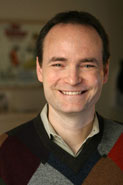Headliners: From tracking troublesome genes to defending Dilton Doiley
Headliners: From tracking troublesome genes to defending Dilton Doiley McGill University
User Tools (skip):
Headliners
From tracking troublesome genes to defending Dilton Doiley
Mapping type 2 diabetes
McGill endocrinologist Dr. Rob Sladek and Dr. Constantin Polychronakos of the McGill University Health Centre were in the worldwide spotlight recently for their research identifying the genes associated with the risk of developing type 2 diabetes. Originally published in Nature and reported widely around the world in such outlets as the New York Times and Le Monde, the findings mark the first time the genetic makeup of any disease has been mapped in such detail. The research team, which included scientists from Imperial College, London, and other international institutions, believes the findings will help stem the dramatic increase of type 2 diabetes in recent years.
Here, there, everywhere

Ashesh Mukherjee is anti-graphic (ads).
Steve Campbell
Ashesh Mukherjee popped up in the news a couple of times in recent weeks. First, the Desautels Faculty of Management professor was cited in a UPI newswire piece that looked at his study on "attribute ambiguity." Seems like when it comes to consumer products, people are more likely to heed the advice of those who share their likes than those who share their dislikes. The busy marketing prof resurfaced in a Montreal Gazette article on a graphic new ad campaign designed to reduce road fatalities in the province. Mukherjee doubts the ads will be effective because while their shocking content immediately grabs our attention (a driver dies in a hospital after being broadsided), our minds usually tune out disturbing images in the long run.
It's a bird, it's a plane, it's...

Daniel McCabe is pro-graphic (novel).
Owen Egan
...Daniel McCabe! The mild-mannered, albeit pithy, associate editor of the McGill News by day, McCabe leaps into action as the defender of comic books by night, as evidenced in the article he wrote for the March edition of University Affairs magazine. According to McCabe, courses about comic books are popping up in universities across the nation because, as they have become more complex, they present an accessible forum through which to engage in studies of complex issues of philosophy, race issues and the flawed nature of people. Graphic novels, which are basically comics on steroids, also serve as novel ways to inject new life into history — a perfect example being Art Spiegelman's Pulitzer Prize-winning Maus series, which tells the story of the Holocaust from the perspective of Jewish mice being persecuted by Nazi cats.
Using video games for good, not evil
These days, it's all fun and games for Mark Baldwin. Research by the psychology professor and his team has suggested that, contrary to the popular view of video games triggering the demise of society, some games can help a person feel better about themselves. In "Mindhabits Trainer," a game developed by Baldwin, players repeatedly pick a smiling face from a group of frowning faces. Unlike the notorious Grand Theft Auto franchise which appears to be little more than a training video for would-be felons, Baldwin's game is people-friendly, reinforcing the concept of looking for acceptance and ignoring rejection. "Stress is largely about social perception," Baldwin said. "When you walk into a crowded room, if your attention is drawn toward the one frowning person in the room instead of all the accepting people, this will tend to increase your feeling of insecurity and actually trigger the release of the stress hormone cortisol into the bloodstream." The story went out on Reuters and was picked up by various media outlets, including the Washington Post and MSNBC.com.

